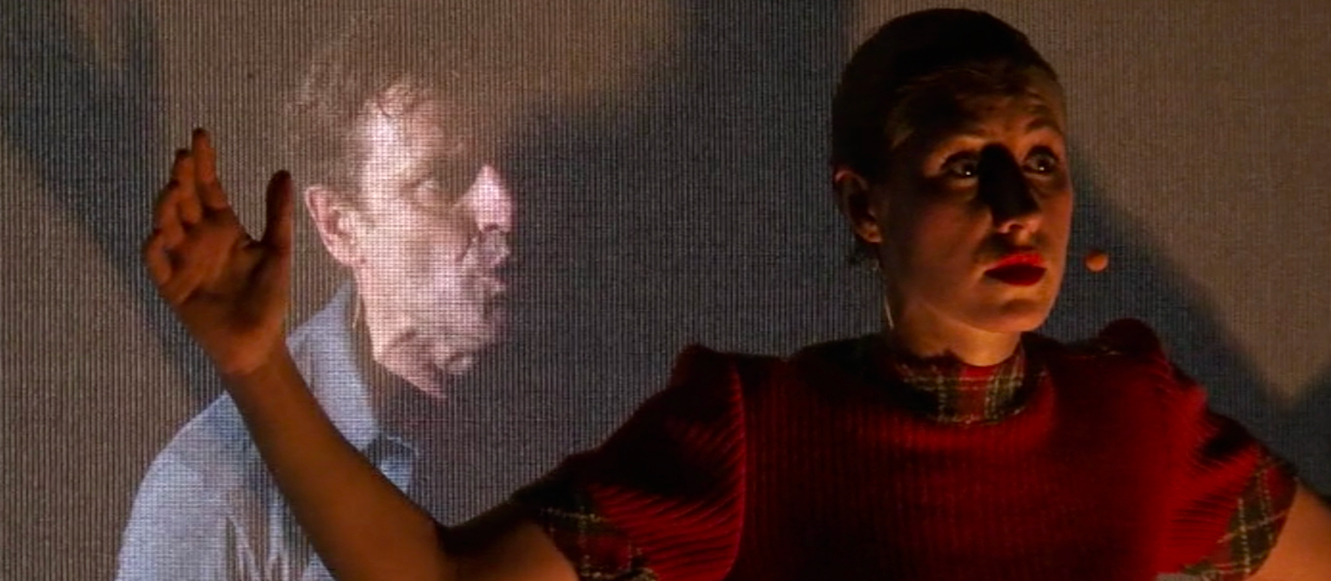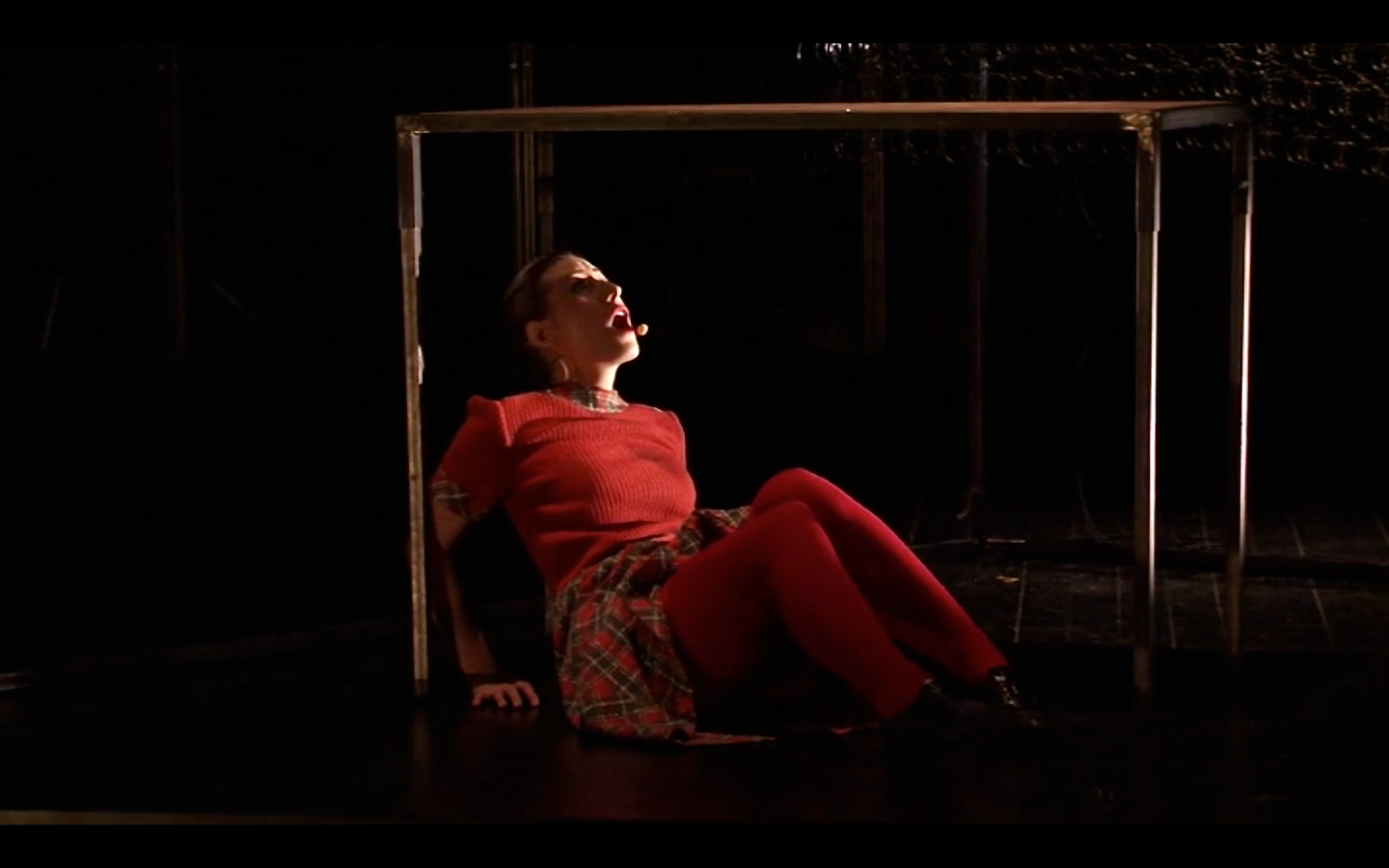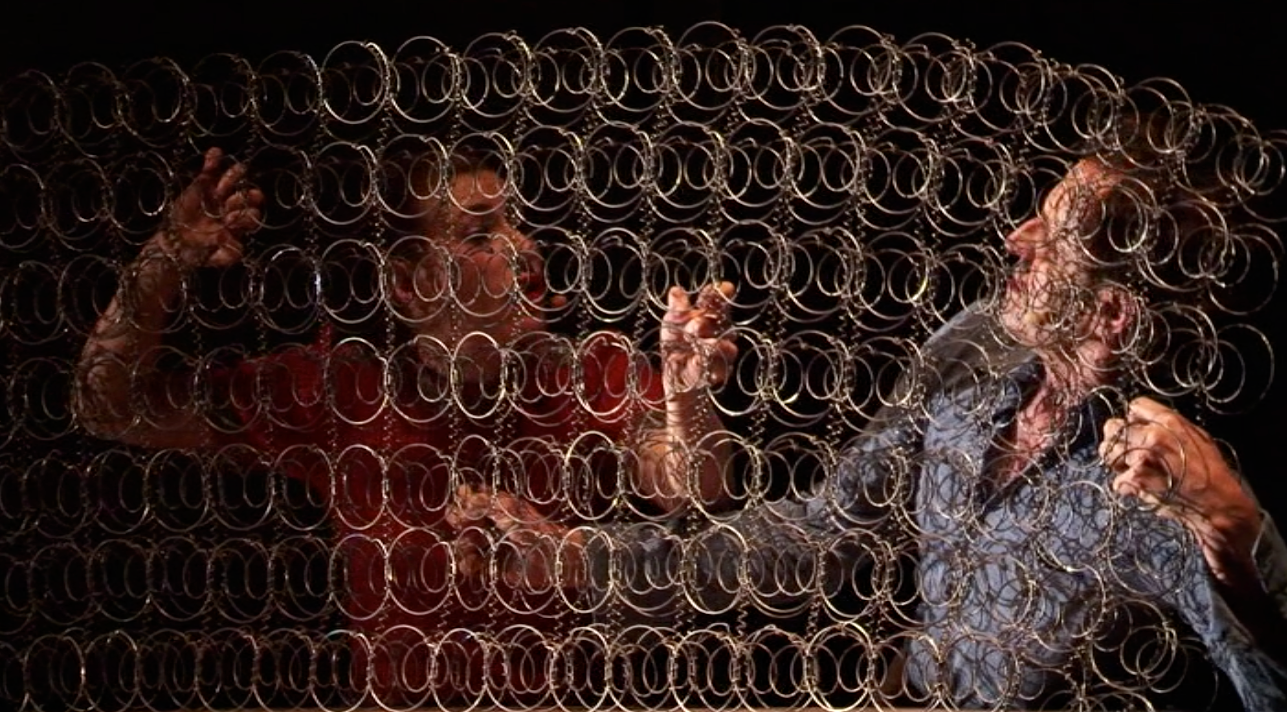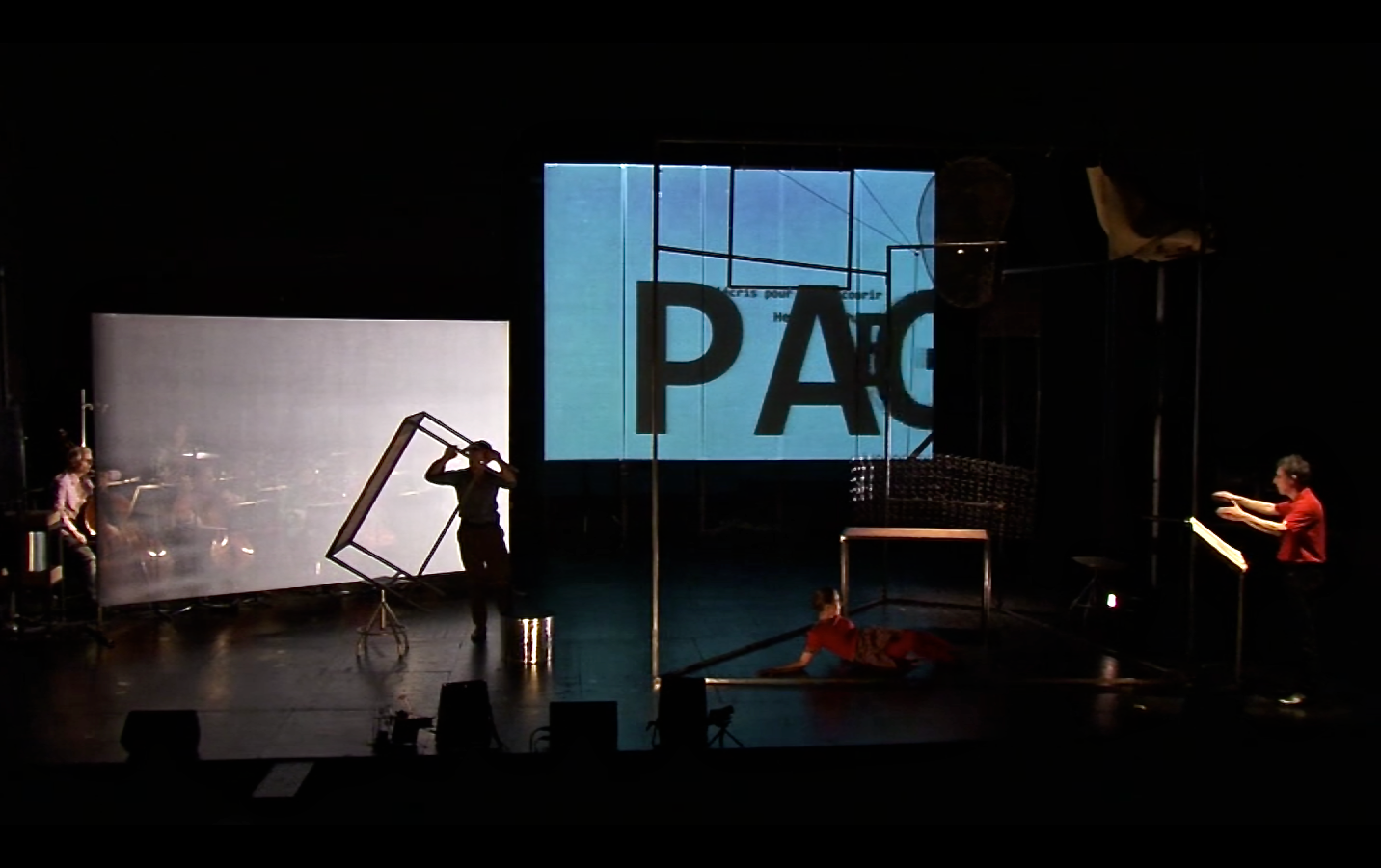"To live is to move from one space to another, trying as hard as possible not to bump into each other."
Georges Perec.
Espèces d'espaces (Species of Spaces) is a philosophical essay published in 1974, containing themes that are relevant today: the redefinition of where we live, the violence of cities, the death of neighborhoods, the rural exodus, war and borders... At a time when the world is experiencing a conflagration of conflicts, author Georges Perec also denounces the barbarity of totalitarian regimes.
Without being narrative, the text gave Philippe Hurel the opportunity to construct a story dealing with everyday things, from the most trivial to the most monstrous. Inspired by Perec's ability to describe the simplest of places and things, as well as the deepest and darkest aspects of being, in a way that is always objective - and often funny - he has written a lively score full of contrasts.
On stage, various characters express themselves: a singer, an actor, a screen on which parts of the text are projected, and a loudspeaker that plays snatches of pre-recorded text.
A deep, funny show that treads a fine line between descriptive logic and the unexpected.
Production
Court-circuit
Commande
de l'État, ministère de la Culture
Coproduction
L'atelier lyrique de Tourcoing ; la Compagnie Les endimanchés
Support
Onda ; Sacem ; fondation Ernst von Siemens ; FCL (Fonds de création lyrique) ; Fondation Tissier Grandpierre
In partnership with
La Criée - Théâtre national de Marseille
Georges Perec
Author
Georges Perec was born in Paris on March 7, 1936 to Polish-Jewish parents, both of whom died during the Second World War: his father at the front in 1940, his mother never to return from Auschwitz, where she was deported in 1943. From autumn 1942 until the end of the war, Perec lived with relatives in Villard-de-Lans and Lans-en-Vercors, where his paternal aunt had brought him. Adopted by this aunt, he returned to Paris in 1945.
After studying literature, where he met Marcel Bénabou, he became a documentalist at the CNRS and published his first articles in Partisans. He published his first novel, "Les Choses", in 1965. This Flaubertian-style "sociological" novel was awarded the Prix Renaudot. In 1966, he published a short story full of verbal inventions, "Quel petit vélo à guidon chromé au fond de la cour?", and the following year joined the Oulipo, becoming one of its leading figures. He experimented with all kinds of formal constraints: "La Disparition" (1969) is a novel written without the letter e (lipogram); "Les Revenentes" (1972), where the only vowel allowed is the e. His most ambitious novel, "La Vie mode d'emploi" (Prix Médicis 1978), is constructed as a succession of stories combined like the pieces of a puzzle, and multiplies narrative and semantic constraints. Perec's work seems to revolve around three different fields: everyday life, autobiography and a taste for stories. Play is always present, as is the quest for identity and the anguish of disappearance. Georges Perec died in Paris on March 3, 1982.
Philippe Hurel
Composer and artistic director of the ensemble Court-Circuit
Born in 1955. After studying at the CRR and the University of Toulouse, then at the CNSMDF in Paris, he took part in the "Musical Research" program at Ircam from 1985/86 to 1988/89. He was a resident at the Villa Medici in Rome from 1986 to 1988. In 1995, he was awarded the Siemens Förderpreis in Munich. From 1997 to 2001, he taught at Ircam as part of the Cursus d'informatique musicale.
He was in residence at the Arsenal de Metz and the Philharmonie de Lorraine from 2000 to 2002. He was professor of composition at the Conservatoire national supérieur de musique et de danse de Lyon from 2013 to 2017. Since 1991, he has been artistic director of the ensemble Court-circuit.
His works have been published by Gérard Billaudot and Henry Lemoine, and performed by prestigious ensembles, including
P. Boulez, E.P. Salonen, K. Nagano, J. Deroyer, PA Valade, FX Roth, T. Ceccherini, P. Rophé, A. Shokhakimov...
Notable works in the last ten years: "Les pigeons d'argile" (opera, libretto T.Viel), Capitole de Toulouse, dir. T. Ceccherini, "Tour à tour" (2008/2015), Festival Manifeste, Philharmonique de Radio-France, dir. J. Deroyer, "So nah so fern I and II" (2015/2021), ensembles Spectra (Ghent), Meitar (Tel Aviv), Court-circuit (Paris), "Entre les lignes" (2017) Witten, Arditti quartet, "Quelques traces dans l'air" (2018), J. Comte, clarinet, Philhar-monisches Orchester Cottbus, dir. J. Stockhammer, "Périple" (2019-20), text by T.Viel, Philharmonie de Paris and Festival Propagations, E. Chauvin, A. Billard and KDM, "Volutes" (2021),
H. Devilleneuve, oboe, Philharmonique de Radio France, dir. P. Rophé, "Nuit de lune" (2022-23), TAP Poitiers, NACO, dir. K.Abe, "Chorus" (2023-24), Y. Kim, flute, Bochumer Symphoniker, dir. TC Chuang, "Soulèvement(s)" (2024), texts by Didi-Huberman, Césaire, Siamanto..., M. Louledjian, soprano, EOC, dir. Bruno Mantovani.
Alexis Forestier
Director
After studying architecture, Alexis Forestier helped found Les Endimanchés, a percussion group with close ties to the alternative scene, in 1985. After a variety of experiences, he developed a passion for avant-garde movements and their relationship to stage writing; this growing interest in forms that blend several artistic practices led him to create the company les endimanchés in 1993. The first show, "Cabaret Voltaire", was inspired by the emergence and research of the Dada movement in Zurich; it was an adaptation of "La Fuite hors du temps" (Flight out of Time) - a diary by Hugo Ball (1913/1921). His subsequent work focused on theatrical writing on the edge of poetic works such as Henri Michaux's "Chaînes" (1994), followed by "Le Drame des constructeurs" (1997), and René Char's "Claire" (1995), followed by "Les Transparents" and "La fête des arbres et du chasseur" (1997). In 1998, with a view to questioning the creative process and the modalities and contingencies that determine it - within a limited economy and operating logic - the company proposed the "Quatre Terrains préparatoires" project, which saw the light of day at Gare au Théâtre in Vitry-sur-Seine. During the same season, it presented Francis Ponge's "La Fabrique du Pré", Bertolt Brecht's "L'importance d'être d'accord", in an operatic form reduced to its smallest dimension, and Maurice Blanchot's "L'Idylle".
This was followed by "Une histoire vibrante", based on Franz Kafka's "Récits et fragments narratifs", and Georg Büchner's "Fragments complets Woyzeck". In 2005, after spending eight years at the La Borde clinic as a trainee and then as a volunteer, he staged Bertolt Brecht's "L'Opéra de quat'sous" with the clinic's patients and carers.
Alexis Forestier's current theatrical work often incorporates the presence of musicians on stage, with projects akin to concert theater where very different musical registers rub shoulders, clash and respond to each other.
An ongoing practice of writing about the company's work and project development (critical and aesthetic reflections on chosen texts, the stage and theatrical performance) has also given rise to numerous publications in magazines since 2003 (Revue Frictions, Revue littéraire Léo Scheer, revue de psychothérapie institutionnelle Institutions, Alternatives théâtrales, Agon, Registres, etc.). This collection of notebooks will be published as Théâtre en éboulis.
Élise Chauvin
Singer, soprano, actress
Élise Chauvin began singing at the age of ten, joining the Maîtrise de Paris directed by Patrick Marco at the CRR de Paris. In 2006, she joined Peggy Bouveret's class at the École Normale de Musique de Paris, where she obtained a Diplôme de Concertiste. Following her studies, she joined the opera studio of the Lyon Opera. As soon as she graduated, Élise Chauvin was engaged as a soloist in a number of productions, quickly acquiring stage experience and a high level of professionalism, and her eclecticism and musical openness led her to interpret a wide variety of roles. A member of the ensemble le Balcon, she sings in works by Karlheinz Stockhausen, Marco Suarez, Peter Eötvös, Fernando Fiszbein, Michaël Levinas...
Élise Chauvin's enthusiasm for the contemporary repertoire has led her to take part in numerous world premieres, including those by Philippe Hurel, Salvatore Sciarrino, Diana Soh, Philippe Manouri, Yann Robin...
Spotted in 2010 for her exceptional stage presence in Philippe Hurel's "Opus Opéra", Élise Chauvin began a parallel career as an actress.
She has performed in numerous theaters and national stages, as well as prestigious venues such as the Philharmonie de Paris, the Bouffes du Nord, the Colon theater in Argentina, the Lille opera house, the Lyon opera house, the Comique opera house, the Harbin opera house in China, the Athénée theater, the Singapore opera house... This season Élise Chauvin performs the roles of Antigone in "Le Cri d'Antigone" by Loïc Guénin and Anne Monfort (Arsenal de Metz, Scène nationale and la Friche la Belle de Mai, Marseille), and of a woman in the monologue "Papillon Noir" by Yannick Haenel, Yann Robin and Arthur Nauzyciel (Théâtre National de Bretagne, Rennes, La Scala, Paris), as Alice in "Alice" by Matteo Franceschini and Edouard Signolet (Théâtre impérial, Compiègne and on tour). Alongside Tanguy Viel and Philippe Hurel, she performed "Périple" at La Criée in Marseille. (...) She will be performing a number of concerts next season, including the premiere of "Carmen Case" by Diana Soh and Alexandra Lacroix with the Queen Chapel Music Chapel (European tour), and "Façon Tragique" by Diana Soh and Severine Chavrier at the Aix-en-Provence Festival (Théâtre des Bouffes du Nord, European tour).
Jean Chaize
Actor
Born in Gap (Hautes-Alpes) in 1954, Jean Chaize studied ballet in Monaco with Marika Besobrasova, in Cannes with Rosella Hightower and in Paris with Youra Loboff. In the 1970s, he worked in France and Spain with a number of choreographers, including Georges Golovine, Anne Béranger, Ethéry Pagava, Aline Roux, Lélé de Triana and Luis Ruffo. Since 1981, he has lived and worked mainly in Germany, initially as a classical dancer at the Staatstheater in Kassel and the Nationaltheater in Mannheim.
From 1988 onwards, he turned to Tanztheater, working under Johann Kresnik at Heidelberg's Städtische Bühne until 2000, then at Bremen's Bremertheater and finally at Berlin's Volksbühne.
His membership of the Berlin scene from 1994 to 2000 clearly shifted his focus from choreography to theater. He performed under the direction of Christoph Marthaler, Ruedi Häusermann, Frank Castorf, Reinhild Hoffmann, Friedrich Lichtenstein, Luk Perceval, Alexis Forestier, Martin Wuttke, René Pollesch, Christoph Schlingensief, Kristin Groß, Karin Henkel, the She She Pop collective, Anta Recke and Max Linz.
Jean Deroyer
Conductor, musical director of Court-Circuit
Born in 1979, Jean Deroyer entered the CNSMD de Paris at the age of 15. Jean Deroyer has been invited to conduct the NHK Symphony Orchestra, Radio SinfonieOrchester Wien, SWR Orchester Baden-Baden, Radio SinfonieOrchester Stuttgart, Deutsches SinfonieOrchester, Orchestres Philharmoniques du Luxembourg et de Monte-Carlo, Sinfonia Varsovia, Orchestre de Paris, Orchestre national de Lille, Orchestre national de France, Orchestre Philharmonique de Radio-France, Orchestre national de Lyon, Ensemble Intercontemporain, Ensemble Modern and Klangforum Wien in venues such as the Vienna Konzerthaus, Berlin Philharmonie, Paris Philharmonie, Tokyo Opera City and Lincoln Center in New York..
In 2010, he created "Les Boulingrin", an opera by Georges Aperghis, followed in 2012 by Philippe Fénelon's opera "JJR". He conducted Michael Jarrell's opera "Cassandre" with Fanny Ardant as recitalist, and Philippe Boesmans' "Reigen" at the Opéra National de Paris. He has also conducted numerous concerts and recorded with the BBC Symphony Orchestra and the RTE National Symphony Orchestra.
He has also made numerous recordings with the Orchestre Philharmonique de Radio France, the Orchestre Philharmonique de Monte-Carlo and the Orchestre National d'Ile-de-France for labels such as EMI Music and Naïve, and for Radio-France. Jean Deroyer has been musical director of the ensemble Court-circuit since 2008 and principal conductor of the Orchestre de Normandie since 2014.
Short circuit
Set
Founded in 1991 by composer Philippe Hurel and conductor Pierre-André Valade, Court-circuit immediately established itself as a first-rate ensemble. Its unwavering commitment to contemporary musical creation is the real cement of the ensemble, and it is to the musicians and their conductor Jean Deroyer that Court-circuit owes its nervous, rhythmic, incisive identity.
More faithful than ever to the "concert" form, Court-circuit is invited by the most prestigious French and international institutions and festivals (Ircam, Radio-France, Fondation Royaumont, Printemps des arts, Venice Biennale, Musica, Traiettorie, Musica Electronica Nova, June in Buffalo, Montréal Musiques Nouvelles, December nights S. Richter, soundfestival. Richter, soundfestival...).
Court-circuit is also involved in numerous multidisciplinary projects (opera, film-concert, dance, etc.). After collaborating with the Opéra de Paris on choreographic creations, the ensemble went on to create chamber operas in partnership with the Théâtre des Bouffes du Nord, the Opéra comique and the Opéra de Massy-Palaiseau. Court-circuit affirms its interest in transmission and mediation, regularly collaborating with conservatories, schools and social organizations. Since 2012, the ensemble has been based in the Hauts-de-Seine region, where it has worked extensively in the area, particularly in the town of Courbevoie, where it has been in residence since 2021. Alongside the ensembles 2e2m, Cairn, Multilatérale and Sillages, Court-circuit founded the Ensemble(s) festival in 2020, a space for the expression of creative music.
Court-circuit's discography includes some fifteen recordings, which have won numerous awards.
Court-circuit receives support from the Drac Île-de-France-Ministère de la Culture, the Région Île-de-France, Sacem, Copie Privée, Spedidam, the Ville de Paris, the Ville de Courbevoie, the Centre National de la Musique and the Maison de la Musique Contemporaine. The ensemble receives support from the Mécénat Musical Société Générale foundation from 2024 onwards.
"For his first opera, Philippe Hurel has achieved a master stroke."
- ResMusica, Franck Langlois
"Hurel's music testifies to a deep understanding of this same text, coupled with a joy beyond measure. Undoubtedly sensitive to the humor of the oulipien, as well as to his intimate wounds, Philippe Hurel has written an absolutely magnificent score which, at the same time as underlining the verb, outlines the same project of exhausting musical space."
- Mouvement, Jérémie Szpirglas
La Criée - National Theater of Marseille
30, quai de Rive Neuve13007
Marseille
LA CRIÉE RATES
Full: €14
Reduced: €9 and €6
- 12 years: €6
DURATION
1h15
Philippe Hurel
composition
Georges Perec
text
Jean Deroyer
musical direction
Court-circuit
ensemble composed of
Anne Cartel
flute
Sylvain Faucon
oboe
Pierre Dutrieu
clarinet
Marin Duvernois, Félix Roth
horn
Pascal Contet
accordion
Ève Payeur
percussion
Jean-Marie Cottet
keyboard
Alexandra Greffin-Klein
violin
Laurent Camatte
viola
Frédéric Baldassare
cello
Didier Meu
double bass
Alexis Forestier
mise en scène
Evi Kalessis
video
ÉliseChauvin
soprano
Jean Chaize
actor
Alexis Baskind
computer music
EtienneDémoulin
sound diffusion
Ruben Trouillet
lighting design






